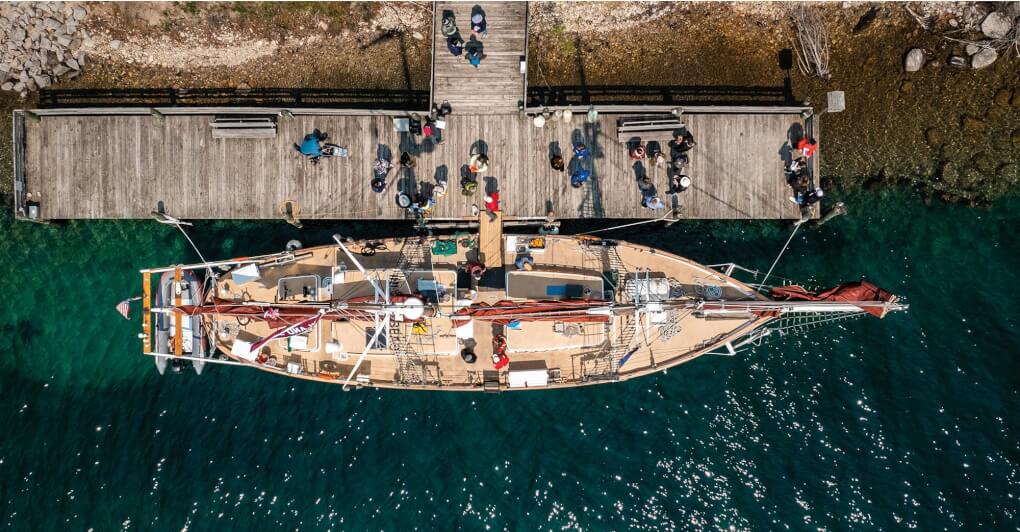During an immersive week spent conducting research and exploring northern Michigan’s natural resources, students in an interdisciplinary studies class learned about the region’s water system and the “wicked problems” it carries.
Kate Fairman’s Wicked Problems in Sustainability class researched issues with stormwater, dam remediation on a river, wastewater and fresh water. It was the first time a faculty member created an immersive week of activities for students in Traverse City. They kayaked along the Boardman River, sailed on a research schooner in Suttons Bay, toured the city’s wastewater treatment plant and biked on Boardman Lake trails.
“They had that experience of both learning and doing research at the same time,” said Fairman, affiliate faculty of interdisciplinary studies. “These types of hands-on experiences are great for students to build their intrigue for water. The heart will then motivate them to take action on environmental issues and develop a love for this type of work.”
Fairman worked closely with Shannon Owen and Jacquelyn Abeyta, from the GVSU Traverse City Regional Center, to plan activities and connect with area water experts, including Native American perspectives on water issues.
Owen, director of the regional center, said the abundance of inland lakes, access to Lake Michigan and other natural resources draw people to the area and serve as one spoke in northern Michigan’s economic wheel. It’s a wheel that the regional center replicates to serve the needs of area residents.
“We emphasize a blue and green economy in this region and it’s important for students to meet the stakeholders and understand the issues associated with water quality,” Owen said.
Following the schoolship tour and days spent kayaking and biking near Boardman Lake, students gave presentations on wicked water issues to community stakeholders.
David Buchanan, a native of Jamaica, is an allied health science major who wants to be a physician assistant. The immersive week taught him how the health of water could impact the health of his future patients.
“One of the pivotal concepts I learned was the danger that septic tank failure, PFAS, microplastics and water quality problems pose to ecosystems and human health,” Buchanan said. “To solve these wicked problems, it’s critical to work together, using transdisciplinary approaches, practicing adaptive management and considering different perspectives.”
Katherine Raphael-Ortega is studying integrative studies; she has aspirations to run for a public office. She said merging the science of water research with its political and socioeconomic aspects provided her with insight and motivation to act.
“The hands-on activities were the best part of the class,” Raphael-Ortega said. “The proposal writing gave me more insight into solving problems in a manner that moves ideas.”

In the hull, Inland Seas instructors lead students through an experiment that tests the water for plankton through a video microscope.
Schoolship
A schooner operated by the Inland Seas Education Association served as a classroom for Fairman’s students in May. Based in Suttons Bay, the schoolship’s instructors led students through four experiments, including trawling for microplastics, learning about PFAS and searching for invasive species, during a four-hour trip.
Ivy Baillie ’21 earned a bachelor’s degree in integrative studies and led an experiment in her role as a schoolship instructor. Baillie lives in Suttons Bay and said the May sail was her first as an instructor. She taught students to look for microplastics in water samples.
“We use various methods to analyze the quantities of microplastics in the lake and how that impacts the health of the lake,” Baillie said. “What we do here on the boat is what real scientists are doing on the Great Lakes, and it’s wonderful to share that with the public.”

Second from left is Kate Fairman, affiliate faculty of interdisciplinary studies, who planned a week of immersive activities for students in her ‘Wicked Problems in Sustainability’ class.

A schoolship instructor hands a mussel to David Buchanan during a tour of Suttons Bay.
Hub for freshwater collaborations
The Traverse City Regional Center has partnered with nearby Northwestern Michigan College, enabling Grand Valley students to customize their degrees for a growing blue and green economy.
Students who transfer to Grand Valley from NMC can customize GVSU’s Bachelor of Applied Science (BAS) degree program specifically for marine technology, freshwater and water environmental quality testing degree pathways. Jason Slade, NMC vice president for Strategic Initiatives, said the partnership and adaptable degree program benefits students and the region.
“The BAS degree addresses the needs of working and adult learners and will be a real asset as we look to grow these programs,” Slade said. “We were also able to open up some of our very unique water-related courses to GVSU students, allowing them to work with industry partners and learn the latest marine and hydrographic surveying technology.”
NMC houses the Great Lakes Water Studies Institute and Great Lakes Maritime Academy and is an education partner for the Freshwater Research and Innovation Center. When completed, developers expect that the $60 million innovation center will establish the Traverse City region as a hub for freshwater research, education and acceleration programs.
Slade said discussions about future collaborations between NMC and Grand Valley’s Annis Water Resources Institute are underway. He called the university an invaluable partner.
“GVSU is extremely active in the community and we can count on them to support the region — from health care to technology to freshwater innovation — they react to the needs of the area,” he said.







